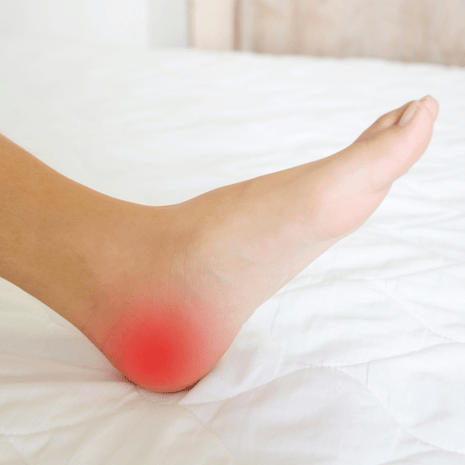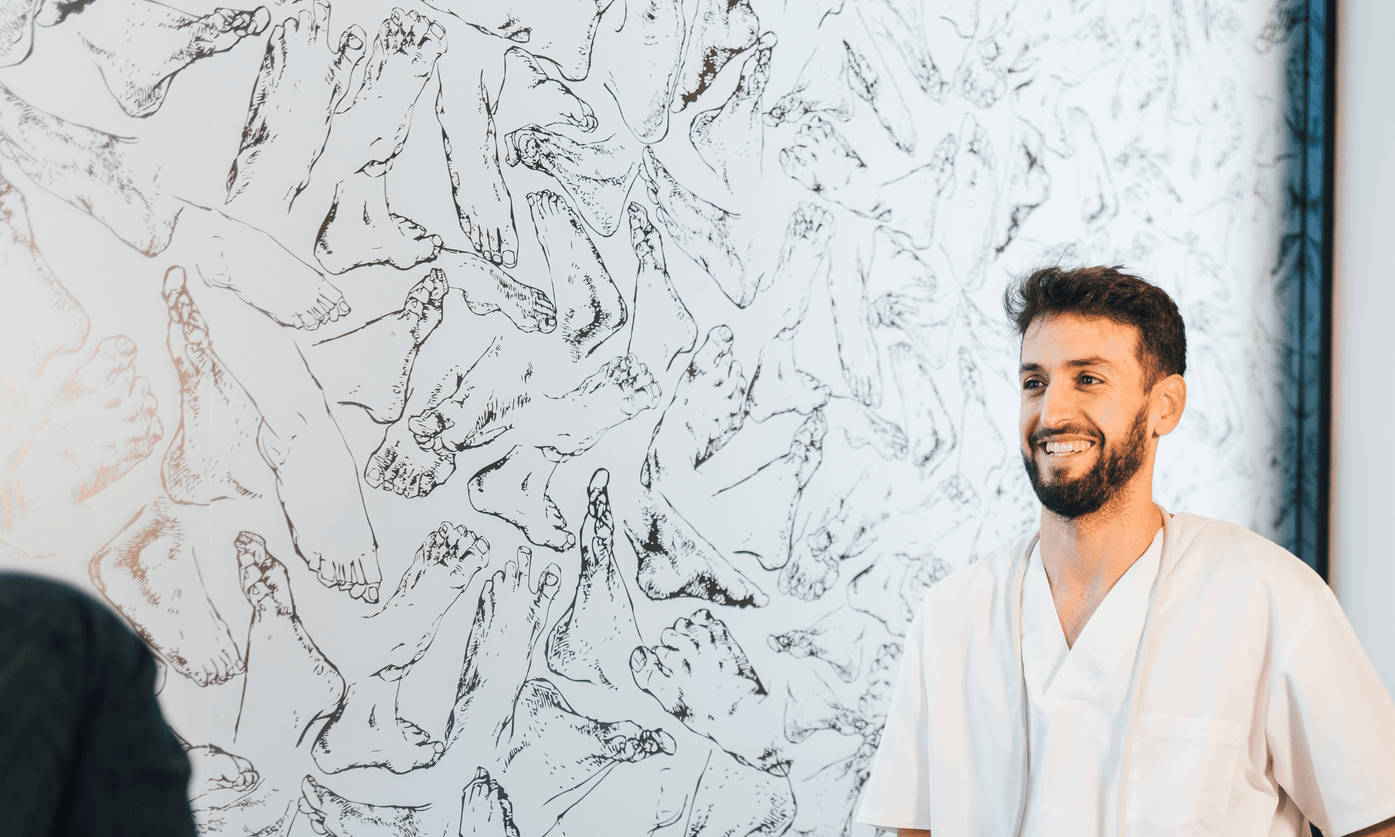Plantar Fasciitis Treatment
at Foot Foundation
Plantar fasciitis is the most common cause of heel pain in adults, producing sharp morning pain and tenderness on the inside of the heel. It develops when the fascia becomes overloaded and degenerates.
At Foot Foundation, we address both symptoms and underlying causes using orthotics, footwear optimisation, shockwave therapy, and progressive rehabilitation to restore long-term foot health.
What is Plantar Fasciitis?
Plantar fasciitis is the most common cause of heel pain in adults. It involves irritation and microscopic degeneration of the plantar fascia, a thick band of connective tissue that runs from the heel bone (calcaneus) to the toes, supporting the arch of the foot.
The condition is often misnamed as an “-itis” (inflammation), but research shows that chronic plantar fasciitis is more accurately a degenerative fasciopathy involving collagen breakdown and reduced tissue integrity, rather than simple inflammation.
At Foot Foundation, we treat plantar fasciitis with a specialist, multi-modal approach, addressing both the fascia and the underlying biomechanical causes to provide lasting relief.
Causes & Risk Factors
Overuse / overload – prolonged standing, running, or sudden increase in activity
Foot structure – flat feet (overpronation) or high arches (poor shock absorption)
Calf tightness – reduced ankle dorsiflexion increasing tension on the fascia
Poor footwear – unsupportive, thin, or worn-out shoes
Obesity or weight gain – increased load on fascia
Occupational factors – jobs involving long periods of standing on hard floors
Age 40–60 – most common in middle-aged adults
Associated conditions – Achilles tightness, posterior tibial dysfunction, fat pad thinning
Treatment at Foot Foundation
Custom orthotics – support the arch, reduce strain on the fascia, and correct biomechanics
Footwear advice – cushioned, supportive shoes with strong midsoles and shock absorption
Shockwave therapy (ESWT) – highly effective for chronic plantar fasciitis, stimulating tissue healing
Manual therapy & mobilisation – improve ankle/foot mechanics
Exercise therapy – stretching the calf and fascia, strengthening intrinsic foot and hip stabilisers
Strapping or taping – short-term relief by reducing fascia load
Load management – modifying activity levels, graded return to sport or work
Referral – for corticosteroid or PRP injections, or surgery (rare, <5% of cases) if conservative care fails
Symptoms
Sharp heel pain with first steps in the morning or after rest, often called “first-step pain”
Pain improving after initial activity but worsening again with prolonged standing or walking
Tenderness on the inner underside of the heel
Stiffness in the arch or heel after inactivity
Pain aggravated by running, jumping, or barefoot walking on hard surfaces
Diagnosis
At Foot Foundation, diagnosis includes:
Clinical history – morning pain pattern, activity triggers, footwear use
Physical exam – palpation of the plantar fascia origin, functional loading tests
Biomechanical analysis – gait, calf length, arch mechanics, pronation/supination control
Imaging (if needed):
Ultrasound – shows fascia thickening (>4 mm) or degeneration
MRI – in atypical or resistant cases to rule out stress fracture or nerve entrapment
Plantar Fasciitis – FAQs
It is degeneration and irritation of the plantar fascia, the thick band of tissue supporting the arch, causing heel pain.
Overload from flat feet, high arches, poor footwear, calf tightness, obesity, or repetitive activity are common causes.
Sharp heel pain is most noticeable with first steps in the morning or after rest. Pain often eases with activity, then worsens with prolonged standing or walking.
Diagnosis is based on history and clinical exam. Imaging such as ultrasound confirms fascia thickening or degeneration.
Mild cases may resolve, but many persist for months or longer if biomechanics and load are not corrected. Early treatment leads to quicker recovery.
Yes. Orthotics support the arch and heel, redistribute pressure, and reduce strain on the plantar fascia. They are a mainstay of treatment.
Supportive shoes with cushioning, firm midsoles, and good arch support are recommended. Avoid flat, worn, or hard-soled shoes.
Yes. Extracorporeal shockwave therapy (ESWT) is supported by strong evidence for chronic plantar fasciitis, especially when standard treatments haven’t resolved symptoms.
Yes. Calf stretches and plantar fascia stretches reduce tension and improve outcomes. Strengthening intrinsic foot and hip muscles also helps prevent recurrence.
If heel pain persists for more than 2 weeks, or is affecting daily activity, a podiatry assessment is recommended. Early intervention prevents chronic symptoms.
Why Choose Foot Foundation?
Foot Foundation provides specialist-level plantar fasciitis care, combining orthotics, shockwave therapy, footwear optimisation, and exercise rehabilitation. We target both the fascia and the underlying biomechanical drivers for lasting relief.
With clinics in Rosedale, Takapuna, Remuera, Botany, Hamilton, and Tauranga, expert plantar fasciitis treatment is available across New Zealand.




